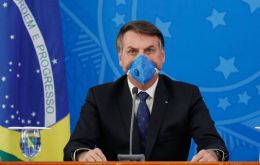MercoPress. South Atlantic News Agency
Tag: recession
-
Thursday, May 7th 2020 - 07:47 UTC
Brazil expects exports to China to help mitigate the contraction of the country's economy

Brazilian Economy Minister Paulo Guedes said that according to initial estimates, the country's economy would shrink 6% as a result of the recession caused by the new coronavirus pandemic, but now, thanks to the increase in exports to China, expectations are of a retraction of only 4% this year.
-
Tuesday, April 14th 2020 - 19:31 UTC
IMF: Uruguay's economy will fall 3% in 2020; Latin America's, 5.2%

According to the estimates of the International Monetary Fund (IMF), the Uruguayan economy will decrease by 3% this 2020. The “great closure” has been how the international body has defined, as the title of its World Economic Outlook, government measures against the global pandemic caused by the COVID-19.
-
Friday, April 10th 2020 - 15:45 UTC
IMF sees emerging markets and low income nations as the most exposed to the coming recession

The International Monetary Fund sees the world economy suffering its worst recession since the Great Depression this year, with emerging markets and low-income nations in Africa, Latin America and Asia at particularly high risk.
-
Thursday, April 9th 2020 - 08:48 UTC
February's services sector confirms Brazil is heading for recession

Services activity in Brazil shrank 1% in February, official figures showed on Wednesday, the biggest monthly fall in over 18 months and another sign Latin America's largest economy was already in go-slow mode before the coronavirus crisis erupted.
-
Saturday, April 4th 2020 - 08:18 UTC
Record unemployment filing in US in two weeks; “economy has slipped into recession”

The number of Americans filing claims for unemployment benefits shot to a record high of more than 6 million last week as more jurisdictions enforced stay-at-home measures to curb the coronavirus pandemic, which economists say has pushed the economy into recession.
-
Saturday, March 28th 2020 - 08:54 UTC
It's official: IMF says pandemic has driven the global economy into recession

The coronavirus pandemic has driven the global economy into a downturn that will require massive funding to help developing nations, IMF chief Kristalina Georgieva said on Friday.
-
Saturday, March 28th 2020 - 08:26 UTC
Brazil's central bank preparing a “financial bazooka” to prevent recession becoming depression

Brazil’s central bank could soon be forced to fire up the money printing presses if the coronavirus-fueled recession facing Latin America’s largest economy is as devastating as some economists fear.
-
Tuesday, March 17th 2020 - 08:15 UTC
Trump urges to halt social activities for 15 days and not congregate in groups larger than ten people

President Donald Trump urged Americans on Monday to halt most social activities for 15 days and not congregate in groups larger than 10 people in a newly aggressive effort to reduce the spread of the coronavirus in the United States.
-
Monday, February 10th 2020 - 08:56 UTC
Cristina Fernandez: Argentina will not pay “even half a cent” of its IMF debt until the country exits recession

Argentine Vice President Cristina Fernandez de Kirchner said on Saturday in Havana that the government will not pay “even half a cent” of its debt back to the International Monetary Fund before the country has exited recession.
-
Friday, January 3rd 2020 - 09:46 UTC
Brazil's 2019 trade surplus shrinks 20%, lowest since recession year 2015

Brazil’s trade surplus shrank 20% to US$ 46.67 billion last year, official data showed on Thursday, as upwardly revised exports in recent months failed to mask a widespread slump in overseas demand for Brazilian goods over the course of 2019.
